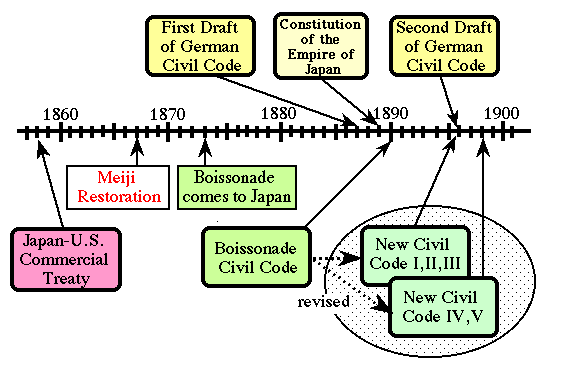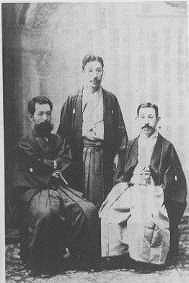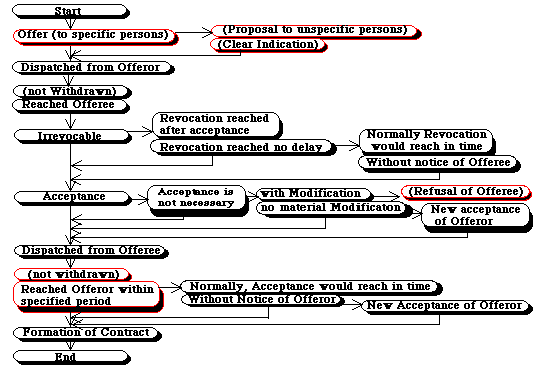
History of the Civil Code of Japan and Comparison with the Uniform Law |
日本民法の歴史と 国際統一売買法との比較 |
| 30 August, 2001 | 2001年8月30日 |
| KAGAYAMA Shigeru | 加賀山 茂 |
Outline of the Historical Background of the Civil Code of Japan |
日本民法典の歴史的背景の概観 |
| The Japanese Civil Code was enacted after the Meiji Restoration(1867) as part of the modernization of the Japanese legal system and the movement to abolish extraterritoriality which was imposed by the Western Powers in the 1850's and had finally abolished in 1899. | 日本民法典は,明治維新(1867年)後に,日本の法制度の近代化の一環として制定された。そして,この民法制定は,1850年代に,西欧列強によって押し付けられた治外法権の撤廃のための運動の一環でもあった。 |
| The Japanese Civil Code which was enacted in 1896 was greatly influenced by two civil law systems. One was French civil law or the Code Napoléon. The first Japanese Civil Code was drafted by the French legal scholar, Boissonade in 1890. | 日本民法典は,1896年に制定された。そして,この民法典は,2つの市民法システムの影響を強く受けている。一つは,フランス民法典(ナポレオン法典)である。最初に,日本民法典は,フランスの法学者ボワソナードによって,1890年に起草された。 |
| The other great influence was that of the German legal system. The Meiji Constitution was based on the Prussian Constitution(1889), and the first (1887) and the second drafts(1896) of the German Civil Code were a great influence in the revision of the Boissonade Civil Code. | もう一つ,日本の民法典に強い影響を与えたのはドイツの法システムである。明治憲法(1889年)は,プロシャ憲法に基づいて制定され,ドイツ民法第1次草案(1887)および第2次草案(1896年)は,ボワソナード民法(旧民法)の改正に非常に大きな影響を与えた。 |

| The Civil Code drafted by Boissonade was promulgated in 1890 but was not put into force because of the strong objections of Japanese legal scholars and politicians. As a result, the new Japanese Civil Code adopted the German Pandekten System which consists of general provisions (in computer language this is called the main routine) and particular provisions (subroutine in computer language). | 日本民法典は,ボワソナードによって起草され,1890年に公布された。しかし,日本の学者および政治家の強い反対にあって,施行されなかった。その結果,新しい民法典は,ドイツのパンデクテン・システム,すなわち,総則(コンピュータ用語では,メイン・ルーティン)と各則(サブ・ルーティン)から成り立っているシステムを採用した。 |
| Therefore, most Japanese legal scholars, both then and even now, believe that the new Japanese Civil Code of 1896 is a copy of the German civil code, not only in its structure but also in its contents. This, however, is not correct. The new Japanese Civil Code is a revised edition of the Boissonade Civil Code, and more than half of its provisions remained without changing nevertheless the superficial structure is wholly changed. | したがって,かなりの日本の学者は,以前も,また,現在においても,日本の新しい民法典は,構造のみならずその内容においても,ドイツ民法典のコピーだと信じてきた。しかし,これは正しくない。日本の新しい民法典は,ボワソナード民法典の修正版である。確かに構造は,完全に変更されたが,内容の約半分は,内容の変更はなされていない。 |
Enactment of Civil Code to revise unequal treaties |
不平等条約を撤廃するための民法典の制定 |
Signing of unequal Japan-U.S. Commercial Treaty(1858) and Meiji Restoration |
日米不平等条約の締結(1858)と明治維新 |
| Due to the lack of knowledge of the Shogunate government officials about international law, the international treaties signed with the Western powers turned out to be extremely prejudicial to Japan. The revision of these treaties to redress these disadvantages became an urgent priority for the Meiji Government. | わが国は,西欧列強と国際条約を締結したのであるが,幕府の役人が国際法について知識を欠いていたため,日本にとって,極端に不利な条約を締結していたことが判明した。この不利益をなくすための条約の改正は,明治政府の緊急かつ最優先の課題となった。 |
| As a condition to revising these treaties, the Western powers demanded modernization (Westernization) of the Japanese legal system. | この条約を改定する条件として,西欧列強は,日本の法制度を近代化(西欧化)することを要求した。 |
| The unification of law and the abolition of extraterritoriality were urgent political problems for Japan. Even if it had been possible to draft a modern civil code out of the indigenous law, the Meiji reformers never thought of such a possibility. They thought of a quicker way, the importation of a finished legal product - the French Civil Code. | 法を統一することおよび治外法権を撤廃することは,日本にとって,緊急の政治課題であった。日本の固有の法から現代民法典を起草することが可能であったかもしれないが,明治の改革者達は,そのような可能性を考えることはなかった。彼らは,より速い方法,すなわち,フランス民法典という最終作品を輸入することを考えたのである。 |
Boissonade Comes to Japan at invitation of the Meiji Government (1873) |
明治政府の招聘でボワソナードが来日(1873年) |
| During this period, France had the most sophisticated and complete codification of laws, including the Code Napoléon, which had a far-reaching impact on Europe and America during the first half of the 19th century. | 19世紀の前半において,フランスは,ナポレオン法典を含めて,もっとも洗練され,かつ,完全な法典を有しており,そのインパクトは,ヨーロッパのみならず,アメリカにも強い影響力をもっていた。 |
| The famous politician ETO Shimpei is said to have ordered MITSUKURI Rinsho to translate the French Civil Code with all possible speed, "never minding mistakes", he said. This was a wonderful idea, but the matter was not so simple. | 有名な政治家である江藤新平は,箕作麟祥に対して,「フランス民法典をありったけのスピードで訳せ。間違いも恐れるな。」と命じた。これは,素晴らしいアイディアであったが,ことは,そう簡単ではなかった。 |
| So the Meiji Government decided to invite Boissonade, an associate professor of Paris University, to draft a modern Japanese Civil Code. He accepted this task and came to Japan in 1873. | そこで,明治政府は,近代日本民法典を起草してもらうため,パリ大学の副教授であるボワソナードを招聘することを決定した。彼は,この申出を受け入れ,1873年に来日した。 |
 |
|
Revision of Boissonade Civil Code |
ボワソナード民法の修正 |
Promulgation of Boissonade Civil Code(1890) |
ボワソナード民法の公布(1890) |
| The Boissonade Civil Code(1890) was the first modern Japanese code in the field of private law. Since the code affected the social and economic life of the nation in all its aspects, it became a topic of great consideration among the educated classes. | ボワソナード民法(1890年)は,私法における日本ではじめての近代法典である。この法典は,すべての面において,国民の社会・経済生活に関連するので,教育水準の高い階層の間で注目を集めるトピックスとなった。 |
| There was heated discussion, especially among lawyers and politicians, as to its merits and demerits. The controversy developed into a dispute between the English and the French schools of jurists, and also into a political struggle between conservative and liberal politicians. The immediate result of this struggle was an eight-year postponement in the enforcement of a civil code. | 特に,法律家と政治家の間では,長所と短所について,白熱の議論が展開された。対立は,法律家の英法派と仏法派との論争へ,そして,政治家の保守派と自由派との闘争へと発展した。この闘争の結果は,民法典の施行の8年間の延期という当面の結末をもたらした。 |
Controversy over Code leads to Postponement of Old Civil Code (1892) |
法典論争から旧民法の施行の延期へ(1892年) |
| French schools of jurists believed that the French code was not merely a French national product but an embodiment of natural law - a model of civilized law. | 法律家の仏法派は,単にフランス国の産物ではなく,近代市民法の模範としての自然法の具体化であると信じていた。 |
| The English school of jurists, however, objected to the idea of natural law expressed by Boissonade. For them, the positive law(customs or case law) was more important and therefore should be taken into consideration. The English school did not consider French law the only civilized system of law and believed the English and German systems must also be taken into account. Some Japanese nationalistic scholars also joined this opposition. | しかし,英法の法律家は,ボワソナードが示した自然法の考え方に反対した。英法の法律家にとって,実定法(慣習法,判例法)がより重要であって,実定法が尊重されなければならない。英法派は,フランス法だけが近代市民法ではなく,イギリスやドイツの法制度も尊重されるべきであると考えた。日本の国粋主義的な学者も,この反対論の側に加わった。 |
Enactment of New Japanese Civil Code (1896, 1898) |
新民法の制定(1896年,1898年) |
| In the end, the supporters of the postponement of the Civil Code won out, and a new drafting committee of three Japanese jurists was appointed. | 最終的に,民法の延期派が勝利をおさめ,新しい起草委員として,3人の日本の法律家が選ばれた。 |
 |
|
They were
|
起草委員は以下のメンバーである。
|
| They followed the policy of the English school and consulted many codes and drafts then available. | 彼らは,英法学派に従って,たくさんの法典を調査し,その後,現行民法の草案を起草した。 |
Enactment as a result of comparative study of law |
比較法の結果としての民法の制定 |
| After many centuries of isolation, Japan suddenly found her independence threatened by world powers and had to obey in the humiliating imposition of extraterritoriality. So urgent was the need to protect her position among the great powers and so earnest was the wish of the Japanese people to abolish the humiliating unequal treaties, that they could not afford the luxury of leisurely studies of foreign laws in order to pick those best suited to the Japanese situation. | 200年以上にわたる鎖国の後,日本は,突如として,その独立が世界の列強によって脅かされていることに気づき,治外法権の屈辱的な押し付けを甘受せざるを得なかった。したがって,緊急の課題は,列強の中にあってその地位を守ることであった。そして,屈辱的な不平等条約を撤廃することは,日本国民の心からの願いであったため,日本にとってベストのものを選択するために,外国法の研究に贅沢な時間を使うという余裕はなかった。 |
Absorption of various provisions of other European countries |
ヨーロッパ諸国のさまざまな規定の吸収 |
| One finds traces of the influence of Anglo-American laws in Japanese public laws in this period, but on the whole it is undeniable that French influence was overwhelming. It was obvious that the common law could not be immediately transplanted into Japan. Studies and lectures on Anglo-American law had also been conducted in this country from an early date but their practical influence on Japanese law was rather weak. | この時期に,日本の公法に対する英米法の影響の足跡を見出す人もいるが,フランスの影響が優越していることを否定することはできない。コモン・ローを直ちに日本に移植することはできないことは明らかである。日本では,英米法が早い時期から研究され,講義もなされたりしたのであるが,日本法における英米法の影響は,大きくはなかった。 |
| The net result of their labor was the arrangement of the new code according to the German Pandekten system rather than the Institutional French system. | 起草者の仕事は,日本の新しい民法を,フランス法流のスタイルではなく,ドイツ流のパンデクテン・システムにしたがって編纂するという結果として現れた。 |
| Although its structure and contents are clearly influenced by the first (1887) and the second(1896) drafts of the German Civil Code, its contents are of a composite nature, showing the dominant influence of French law and here and there the influence of English law(such as Article 43 of the Japanese Civil Code on the capacity of juristic persons that is the doctrine of ultra vires and Article 416 on the measure of damages that is the rules relating to remoteness of damages as laid down in Hadley v. Baxendale(1854). | 確かに,日本の民法典の構造や内容には,明らかに,ドイツ民法典の第1草案(1887年)と第2草案(1896年)からの影響が見られる。しかし,その内容は,いろいろな法を取り入れた混合物である。まず,フランス法がもっとも大きな影響を与えており,そこかしこに,英米法の影響が及んでいる(例えば,日本民法43条は,法人の能力について,目的外の行為は無効であるという「能力外」(ultra vires)原則の影響を受けているし,民法416条の損害賠償の範囲については,Hadley v. Baxendale事件(1854年)の因果関係に関するルールの影響を受けている)。 |
Great effect of German Civil Code on revision of Boissonade Code |
ボワソナード民法の修正におけるドイツ民法の影響 |
| Japanese people (including Japanese scholars) believed that the new Japanese Civil Code was modeled after the First Draft of the German Civil Code. But this legend does not conform to the facts. In fact, if one examines the Japanese Civil Code one finds that the first three books are genealogically nearer to the French Civil Code than to the First Draft of the German Civil Code. | 日本人は,学者を含めて,現行民法典は,ドイツ民法典の第1草案をモデルに起草されたと信じている。しかし,この神話は,事実によって確かめられているわけではない。実際,日本民法典を詳細に調べてみると,最初の3編は,系譜的には,ドイツ民法の第1草案よりも,フランス民法典に近いことが確かめられている。 |
| The work of new drafting committee members, that is HOZUMI, UME, TOMII, was meant to be an "amendment" to the Boissonade Civil Code, the purpose of the committee being to "examine each article of the Boissonade Civil Code and to make necessary amendments and corrections". Most of those provisions which were continued substantially unchanged from the Boissonade Civil Code should be regarded as originating from French law. | 日本民法の起草委員,すなわち,穂積陳重,梅謙次郎,富井政章は,ボワソナード民法典の「修正」を考えていたのであり,起草委員会の目的は,「ボワソナード民法典の各条項を調査し,必要な修正を行うこと」であった。日本民法典の条文の多くは,フランス法に起源をもつと考えられているボワソナード民法典の条文を実質的には修正しないまま採用しているのである。 |
Japanese Civil Code as a revision of Boissonade Civil Code |
ボワソナード民法典の修正としての日本民法典 |
| It is true that the new Japanese Civil Code was based upon extensive research in the laws of a large number of civilized nations. | 日本民法典は,非常に多くの文明国の法律を徹底的に調査した後に制定された比較法の産物である。 |
| For example, English law, such as the doctrine of ultra vires on the capacity of juristic persons was adopted in Art. 43 of Japanese Civil Code and the rules relating to remoteness of damages as laid down in Hadley v. Baxendale (1854) was also adopted in the Art. 416 of Japanese Civil Code. The Art. 416 is considered one of the most important provisions in the Japanese Civil Code. | 先にも述べたように,英米法の法人における「能力外」原則は,民法43条において採用されているし,Hadley v. Baxendale(1854年)において下された損害賠償の範囲に関するルールも,日本民法416条において採用されている。なお,416条は,日本民法において,最も重要な条文の一つであると考えられている。 |
| It is also true that the First and Second Drafts of the German Civil Code were carefully studied and were influential among the drafting committee members. But one of the new drafting committee members, UME has written as follows : there are some who now say that the present Civil Code is based solely upon German law, on the ground that it is nearer to the German Code in its style. This is a mistaken view. The French Civil Code as well as other codes in France, scholarly opinions and judicial precedents thereon were referred to, at least to the same extent as German law. | ドイツ民法の第1草案,第2草案が詳細に調査され,起草委員の間で影響力を持ったのは事実である。しかし,起草委員の一人である梅謙次郎は,以下のように述べている。 「現行民法典は,スタイルがドイツの法典に近いことから,ドイツ法のみの影響を受けていると言う人がいる。しかし,それは,間違った見解である。現行民法典は,少なくともドイツ法と同じ範囲で,フランス民法典,その他のフランスの法典,フランスの学説,判例が参照されている。」 |
Comparison of the Three Civil Codes |
フランス民法典,ドイツ民法典,日本民法典の比較 |
| The present Civil Code, though based upon the Boissonade Civil Code, differs from the latter in its composition. Adopting the "Pandekten System", it was divided into five books. In this sense, one might say that there was a shift from the French style to the German. Yet two things must be noted. | 日本民法典は,ボワソナード民法典に基づいているが,その構成において,ボワソナード民法典と異なっている。日本民法典は,パンデクテン方式を採用しており,5編から成り立っている。この意味で,日本民法典は,フランス方式からドイツ方式へとシフトしている。しかし,以下の2点に注意すべきである。 |
|
|
|
|
|
|
|
Comparison of the Japanese Civil Code and CISG(United Nations Convention on Contracts for the International Sales of Goods) as the Newest Uniform Law |
日本民法典と最新の統一法としての国連国際動産売買条約(CISG) |
Formation of Contract in Civil Code and CISG |
契約の成立における日本民法典と国連国際動産売買条約(CISG)との比較 |
| Regarding the formation of a contract, the Japanese Civil Code contains provisions which are similar to CISG. | 契約の成立に関しては,日本民法典は,国連国際動産売買条約(CISG)とほとんど同じ規定を持っている。 |
|
|
|
|

| There are some provisions in CISG that are not contained in the Japanese Civil Code. One is the definition of the offer and invitation to make offers(Art. 14). The other is the termination of the offer when a rejection reaches the offeror(Art. 17). In Japan, it is not considered necessary to provide a specific section and is therefore left to interpretation. But such provisions are useful in preventing disputes concerning interpretation. | 国連国際動産売買条約(CISG)には,日本民法典には,含まれていないいくつかの規定が存在する。一つは,申込と申込の誘引の定義である(CISG14条)。もう一つは,申込の拒絶が申込者に到達した場合の申込の失効である(CISG17条)。日本においては,そのような特別の規定は必要ではなく,その問題は解釈に委ねられていると考えられている。しかし,このような規定は,解釈に争いが生じた場合に有用である。 |
| The most important difference between CISG and the Japanese Civil Code is the time of formation of the contract. | 国連国際動産売買条約(CISG)と日本民法との重要な相違は,契約の成立の時期である。 |
| CISG provides that a contract is concluded at the moment when an acceptance of an offer becomes effective(Art. 23). And CISG provided moreover that an acceptance of an offer becomes effective at the moment the indication of assent reaches the offeror(Art. 18 (2)). | CISGは,契約は,申込の承諾が効力を生じたときに成立すると規定している(CISG23条)。そして,CISGは,さらに,申込に対する承諾は,同意の意思表示が,申込者に到達した時にその効力を生じると規定している(18条2項)。 |
| On the other hand, the Japanese Civil Code provides that a contract comes into existence at the time when notice of acceptance is sent (section 516). In the Japanese Civil Code, there is no room to revoke the acceptance once it has been sent , but according to CISG, an acceptance may be withdrawn if the withdrawal reaches the offeror before or at the same time as the acceptance would have become effective(Art. 22). | これに反して,日本民法典は,契約は,承諾が発信された時に契約は効力を生じると規定している(民法516条)。日本民法典においては,承諾がいったん発信されると,その時点で契約が成立してしまうので,承諾を撤回する余地はない。しかし,国連国際動産売買条約によれば,承諾は,その撤回通知が,承諾の効力が生じたであろう時よりも前またはそれと同時に申込者に到達すれば,撤回できる(CISG22条)。 |
|
But on the on hand, Japanese Civil Code provide that an offer and an acceptance is not effective if the indication of assent does not reach the offeror within the time he has fixed(section 521 paragraph 2) in spite of section 516(Principle of dispatch). This is the same result of the Art. 18 (2) CISG. |
しかし,一方で,日本民法典は,承諾の発信主義(民法526条)をとっているにもかかわらず,承諾が承諾期間内に到達しないときは,申込も承諾も効力を生じないと規定している(民法521条2項)。これは,CISG18条2項と同じである。 |
| On the other hand, CISG provide that if the offeree may indicate assent not by notice but by performing an act, the acceptance is effective at the moment the act is performed(Art. 18 (3)) in spite of Art. 18(2)(Principle of arrival). This is the same result of the section 516 paragraph 2 of the Japanese Civil Code | 他方で,国連国際動産売買条約(CISG)は,到達主義(Art. 18(2))をとっているにもかかわらず,承諾者が通知ではなく,ある行為によって同意を示すことができる場合には,承諾はその行為がなされたときに生じるとしている(CISG18条3項)。これは,日本民法典526条2項と同じである。 |
| Therefore, in concrete cases, the result of formation of contract from Japanese Civil Code and from CISG is almost the same in spite of difference of the two principles. | このように,具体的な事例における契約の成立の結果は,二つの主義の対立にもかかわらず,日本民法典と国連国際動産売買契約との間でほとんど相違がない。 |
Remedies for Breach of Contract under the Civil Code |
契約違反の場合の救済に関する日本民法の規定 |
| Under the Japanese Civil Code, remedies for breach of contract are restricted by an element. | 日本民法典の下では,契約違反に対する救済は,一つの要素によって制限されている。 |
| The element is the fault of obligor. If there is no fault on the part of the obligor, the obligee cannot claim either avoidance nor damages, nevertheless the specific performance is possible. | その要素とは,債務者の帰責事由である。もしも,債務者の側に過失がなければ,債権者は,特定履行は請求できるにもかかわらず,解除も損害賠償も請求することができない。 |
Remedies for Breach of Contract under CISG |
契約違反の場合の救済に関する国連国際動産売買条約の規定 |
| Under CISG, remedies for breach of contract are independent of each other. So, the remedies available to the obligee are much wider than those possible under the Japanese Civil Code. | 国連国際動産売買条約(CISG)の下では,契約違反の救済は,それぞれが独立しているので,日本民法典の下での救済よりも債権者は,より多くの救済を利用できる。 |
| Under CISG, the obligee can claim not only damages, avoidance but also specific performance. The only restriction to this is contained in Art. 28. | CISGの下では,債権者は,損害賠償,解除のみならず,特定履行も請求できる。ただし,特定履行については,CISG28条の制限に服する。 |
| Under CISG, in order to claim avoidance it is only necessary to consider whether the breach is fundamental or not, and it is not necessary to consider any fault on the part of the obligor. | CISGの下では,解除を請求するには,契約違反が重大であるかどうかだけを考慮するだけでよい。債務者の側に帰責事由があるかどうかを考慮する必要はない。 |
| Under CISG, apart from the exemption provisions contained in Articles 79 and 80, damages are always available as a remedy.On this point, under the Japanese Civil Code, the situation of the parties is almost same as CISG. | CISGの下では,79条と89条に含まれる免責条項を別にすれば,損害賠償請求は,契約違反の救済として常に利用可能である。この点に関しては,日本民法典の場合もCISGとほぼ同様である。 |
Conclusion |
結論 |
I would like to close my report by summarizing the main
points.
|
主要な点を要約して結論としたい。
|